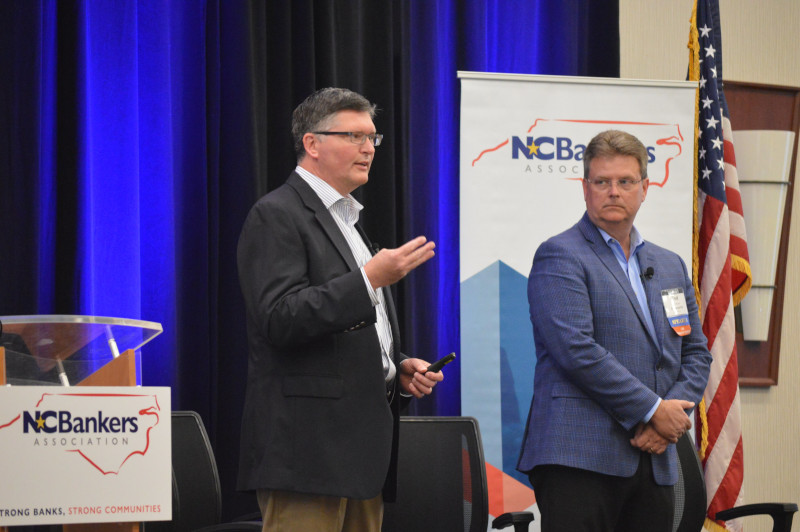North Carolina Bankers Association (NCBA)
Strong Banks. Strong Communities
Business View Magazine interviews Peter Gwaltney, President & CEO of the North Carolina Bankers Association for our focus on the Professional Banking Industry
Proudly serving North Carolina’s banking industry since 1897, the North Carolina Bankers Association (NCBA) brings together all categories of banking institutions that best represent the interests of its rapidly changing state. In its role as a professional trade organization, the NCBA provides advocacy, leadership, and support for its dynamic membership base.
The NCBA promotes the professional and educational development of its members and affiliate members, and also communicates with the North Carolina General Assembly, the U.S. Congress, and banking regulators on behalf of its member banks, savings institutions, and trust companies. The NCBA also provides media relations support and regulatory and compliance assistance.
Business View spoke with Peter Gwaltney, President & CEO of the North Carolina Bankers Association, who shared some fascinating insights about the industry.
BVM: The NCBA began over a century ago. How has your association evolved to serve members?
Gwaltney: “We were organized in 1897 to be the advocate for North Carolina’s banking industry, and today that is done in our General Assembly in Raleigh and in the Office of Commissioner of Banks, our state banking regulator, and also in Washington with all the regulatory agencies in Congress with our delegation. Although the issues have changed, the people have changed, and our methods have changed, the initial mandate has not. We are focused on our mission just like we were back in 1897.
“Since then we’ve expanded to serve the evolving needs of our membership. We now have a staff of 21 and three NCBA subsidiaries. We provide a group health insurance plan and employee benefits for all the community banks in the state through our Community Bank Services subsidiary. Another subsidiary, Centrant Community Capital, offers a lending opportunity for banks in the form of participation on loans that provide long-term debt for affordable housing developers. That part of our association is 32 years old and we passed the $500 million mark in terms of the total amount of loans that we’ve made in the history of the subsidiary.
“Our third subsidiary, Community Insurance Services, offers a digital insurance platform for banks to be able to provide insurance to their customers. In addition, NCBA is constantly asking what are the needs of the industry? And discussing what we can do to help through collaboration to marshal forces to lower the cost of doing business or to bring a revenue opportunity that they might not otherwise have on their own.”

BVM: What type of banks make up your membership?
Gwaltney: “There are roughly 84 banks doing business in the State of North Carolina and we represent them all. Our largest member is Bank of America, second largest is Truist, and our smallest member is Hertford Savings Bank with $16 million in assets and three employees. The members’ issues are very diverse and sometimes very complex. Every day is different. Certainly, we have strategies and plans and long-term initiatives but you just never know what the next phone call will be. And I like it that way.”
BVM: When it comes to advocacy, what are some of the prominent issues right now?
Gwaltney: “In North Carolina, most of our banking laws have been modernized over the last decade. Each legislative session here consists mostly of small, technical bills that are not controversial and don’t require heavy lobbying and media relations to get them passed. Most of our banking legislation and regulatory efforts are focused in Washington. One of the big issues we’re watching right now is the Safe Banking Act that makes it legal for banks to do business with cannabis-related businesses. Many states have now legalized marijuana, either medicinally, recreationally, or both. The problem is that it’s illegal at the federal level. So banks cannot do business with businesses that have anything to do with cannabis. That means those businesses have to operate on a cash basis – keep money in the vault and just be very careful. They can’t deposit it in the bank like any other retailer.
“So we are lobbying that it’s a public safety hazard; that the money needs to be in the banking system, so it can be tracked by law enforcement and taxed by the IRS. And just to be safer. This legislation would also make it very clear that a bank can do business with a cannabis-related business and eliminate the potential for an inadvertent violation of law, which is where we are today. Because you can be doing business with a cannabis-related entity and not know it.
“Cannabis is not legal in any fashion here in North Carolina, but we’re supporting the legislation and lobbying for the bill because it’s good for the country and good for the banking system. That’s how state bankers associations work, both at the state and national level – we coordinate, we talk, we communicate, and we work together to push legislation that’s good for the industry, not necessarily just what’s good for our state.”
BVM: How did NCBA help out the banks when COVID hit?
Gwaltney: “As COVID hit in March of 2020, we were communicating with our members to help them know what was happening around the country and around the state. What best practices were for who was closing and when. How they were handling families who worked for the bank and had school age children when schools were closing. How to do business and manage a bank in a very tricky health environment, while still serving the public and protecting employees at the same time.
“We communicated by email all the information from state government, the CDC, and anything new that came out – all hours of the day and night and weekends. We learned all that we could from the CARES Act as it was going through the process for the SBA program. We had to wait for the Treasury to publish the rules for the Paycheck Protection Program and when the document finally came out, we had to send it that night with some analysis to our members – knowing that bankers would be up most of the night reading and preparing for customers and small business owners to come into their banks the next day to apply for a loan that the banks didn’t know much about.
“Through the American Bankers Association, we and other state bankers associations were having Zoom calls daily for the first few months of the PPP because there were new rules and questions that weren’t anticipated that they had to answer. I sat in my office seven days a week, getting those updates and typing up emails to send to all of our member banks. The expectation of our members was if they weren’t hearing from us, there was nothing to report. That’s how an association effectively serves its members.

“But the bankers were the true heroes because they were literally building a plane while it was taking off. They did a remarkable job and put millions of dollars into their communities to help small businesses stay afloat and did it all out of a sense of duty and patriotism.”
BVM: How does the NCBA promote banking as a career?
Gwaltney: “It is a great career. A lot of high school and college students don’t know the wide variety of opportunities available as a banker. From the retail piece to commercial banking, investment banking, IT, security, human resources, marketing. We have a Bankers in Schools program through our 75 member North Carolina Young Bankers division (bankers who are 45 years of age and younger) and every April they go into the schools and teach a simple budgeting lesson and give some guidance and inspiration to students.
“Because there is a great need to diversify our workforce, we’re also partnering with the 12 North Carolina HBCUs (Historically Black Colleges & Universities) and the Risk Management Association (RMA) and we’re going to teach the RMA Credit Essentials curriculum in the HBCU business schools, where students can participate in our Future Bank Leaders ‘club’ program. When they graduate, they will have a college degree wrapped around an RMA Credit Essentials certificate, which tells an employer they’re ready to go to work in credit analysis and on their way to becoming commercial bankers.”
BVM: “What does the landscape look like for NCBA over the next three to five years?
Gwaltney: “The number of bank employees in North Carolina has grown to 90,000. Banks have 2100 branches across the state. So the industry here is vibrant and doing well. At NCBA, we’ll continue to be strong and growing for the foreseeable future. We’re adding staff and building our leadership team so that we can do even more. This industry is resilient and will guide our economy through whatever comes our way.”
AT A GLANCE
North Carolina Bankers Association (NCBA)
What: The professional trade organization for bankers in North Carolina
Where: Based in Raleigh, North Carolina
Website: https://ncbankers.org/


